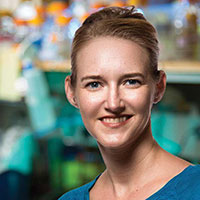Julie Law
“The expression of genetic information within each cell must be precisely regulated for normal development, as is evident by the numerous diseases and developmental defects associated with aberrant gene expression. One layer of gene regulation involves the addition of chemical groups, or ‘epigenetic modifications,’ to chromatin, a combination of DNA and proteins in a cell’s nucleus. I am interested in understanding how these chemical instructions are recognized and translated into stable gene expression patterns.”
In plants, mammals and other eukaryotic organisms, the addition of epigenetic modifications to both DNA and histones (proteins that package and order DNA) are known to influence the expression of the underlying genes and to play critical roles in diverse biological processes, including cellular differentiation, development and the maintenance of genome integrity. However, compared to the amount of data generated over the last few decades regarding the proteins and pathways responsible for establishing, maintaining and removing epigenetic modifications, relatively little is known about how epigenetic modifications actually lead to changes in gene expression and chromatin structure.
The plant Arabidopsis thaliana provides an ideal system to study epigenetic processes. It is genetically malleable, highly amenable to whole genome analyses and, unlike mammals, is highly tolerant of dramatic changes to its epigenetic code. In addition, plants and mammals share many of the key proteins and pathways involved in establishing and maintaining epigenetic modifications, so findings in plants may be applicable to animals and humans. To gain a better understanding of the cascade of events that lead from the addition or removal of a particular epigenetic modification into a change in gene expression, Law focuses on the characterization of several newly identified families of chromatin binding proteins. By employing genetic, biochemical and genomic approaches, she aims to determine the epigenetic modifications recognized by these protein families, identify their interacting partners and determine their effects on gene expression and higher order chromatin structure. This will provide a holistic view of how epigenetic modifications control gene expression.
Such studies will begin filling a gap in our current understanding of epigenetic gene regulation and will greatly enhance our ability to understand and control the expression of existing and newly introduced genes, which has broad implications in both agriculture and gene therapy.
